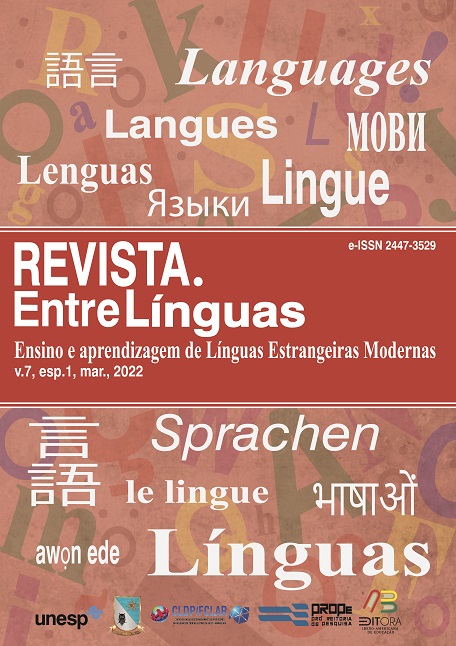Comunicação verbal e manipulação linguística em conflitos jurídicos
DOI:
https://doi.org/10.29051/el.v8iesp.1.16918Palavras-chave:
Comunicação verbal, Manipulação Linguística, Mediação, Resolução de Conflitos e DisputasResumo
O artigo discute as principais disposições teóricas da comunicação verbal e da manipulação linguística na resolução de conflitos jurídicos. Com base nos materiais estudados, os autores do artigo revelaram certas características do discurso para efetivamente reconhecer e localizar um conflito, desenvolver ações construtivas e encerrá-lo adequadamente. Eles determinaram os fatores de manipulação linguística em um conflito e modelos de comportamento de fala, bem como fundamentaram a necessidade de usar tais modelos para harmonizar relações em um conflito para sua localização. Há necessidade de mais pesquisas para estudar a eficácia da comunicação verbal e manipulação linguística, analisar a viabilidade do uso de vários meios de fala na resolução de disputas e conflitos.
Downloads
Referências
AMUSEGHAN, A. Language and communication in conflict resolution. Journal of Law and Conflict Resolution, v. 1, n. 1, p. 1-9, 2009. Available in: https://academicjournals.org/journal/JLCR/article-full-text-pdf/EE4B4AB575#:~:text=Language%20and%20communication%2C%20therefore%2C%20are,of%20many%20writers%20and%20researchers. Access in: 11 Jan. 2021.
MCKINNEY, B. C.; KELLY, L.; DURAN, R. L. The relationship between conflict message styles and dimensions of communication competence. Communication Reports, v. 10, n. 2, p. 185-196, 1997. Available in: https://www.tandfonline.com/doi/abs/10.1080/08934219709367674. Access in: 07 Feb. 2021.
CONRAD, C. Communication in conflict: Style strategy relationships. Communication Monographs, v. 58, n. 2, p. 135-155, 1991. Available in: https://www.researchgate.net/publication/248925014_Communication_in_Conflict_Style-Strategy_Relationships. Access in: 20 Mar. 2021.
KOTSUR, V. et al. The Language of Confrontation in Everyday Discourse: Intentional Depreciation. Psycholinguistics, v. 29, n. 1, p. 100-116, 2021. Available in: https://psycholing-journal.com/index.php/journal/article/view/1188. Access in: 16 Apr. 2021.
ABRAMOVA, N. A. Yuridicheskaya dialogika. Moscow: INFRA-M, 2017.
BÜHLER, K. Teoriya yazyka. Moscow, 1993.
GLUKHOV, V. P. Osnovy psikholingvistiki. Moscow: Astrel, 2005.
KRONGAUZ, M. A. Semantika. Moscow, 2002.
KUNITSYNA, V. N.; KAZARINOVA, N. V.; POGOLSHA, V. M. Mezhlichnostnoe obshchenie. Saint Petersburg: Piter, 2002.
MOKHOROVA, A. YU.; MOKHOROV, D. A. The legal aspects of conflict management. s.l.: n.d., 2013.
PETROVSKII, A. S. General psychology. Moscow: Prosveshchenie, 1976.
RUBINSTEIN, S. L. The foundations of general psychology: In two volumes. Moscow: Pedagogika, 1989.
TRETYAKOVA, V. S. Conflicts in linguistic categories. Yurislingvistika, v. 10, n. 10, p. 141-149, 2010. Available in: https://cyberleninka.ru/article/n/konflikt-v-lingvisticheskih-kategoriyah-1. Access in: 17 June 2021.
KHOKHLOV, A. S. Conflict management. History. Theory. Practice. Samara: SF; GBOU; VPO; MGPU, 2014.
Downloads
Publicado
Como Citar
Edição
Seção
Licença

Este trabalho está licenciado sob uma licença Creative Commons Attribution-NonCommercial-ShareAlike 4.0 International License.
Os manuscritos aceitos e publicados são de propriedade da Revista EntreLínguas. Os artigos publicados e as referências citadas na Revista EntreLínguas são de inteira responsabilidade de seus autores.
Transferência de direitos autorais – autorização para publicação
Caso o artigo submetido seja aprovado para publicação, já fica acordado que o(s) autor(es) autoriza(m) a UNESP a reproduzi-lo e publicá-lo na EntreLínguas, entendendo-se os termos “reprodução” e “publicação” conforme definição respectivamente dos incisos VI e I do artigo 5° da Lei 9610/98. O artigo poderá ser acessado pela rede mundial de computadores (Internet), sendo permitidas, a título gratuito, a consulta e a reprodução de exemplar do artigo para uso próprio de quem a consulta, desde que haja a citação ao texto consultado. Essa autorização de publicação 328 EntreLínguas, Araraquara, v. 1, n .2, p. 323-328, jul./dez. 2015 não tem limitação de tempo, ficando a UNESP responsável pela manutenção da identificação do(s) autor(es) do artigo. Os artigos publicados e as referências citadas na Revista EntreLínguas são de inteira responsabilidade de seus autores.











